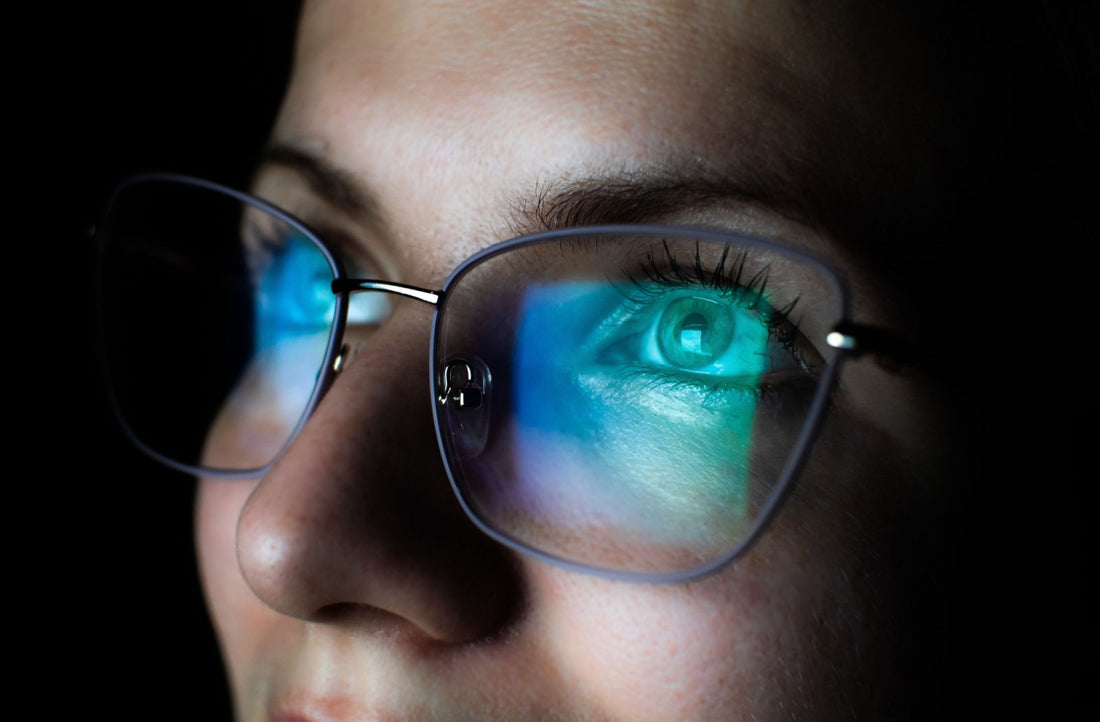Quick answer: Blue light glasses may help reduce digital eye strain symptoms like headaches and tired eyes, but they don’t block all risks from screen use. They can be useful for office workers, gamers, and students who spend long hours in front of computers and devices.
We’re spending more time than ever on screens, from laptops and tablets to phones and TVs. With that comes complaints of tired eyes, blurred vision, and poor sleep. Enter blue light glasses, also known as computer glasses, promising to filter out the harsh light from digital devices. But do they actually work, or are they just another trend?
What Is Blue Light?
Blue light is part of the visible light spectrum, sitting at the high-energy, short-wavelength end. It comes naturally from the sun but is also emitted by digital screens and LED lighting. While it’s not inherently bad, too much exposure, especially late at night, can disrupt your sleep cycle. Many people also link blue light to digital eye strain, which has made computer glasses increasingly popular.
Do Blue Light Glasses Really Work?
According to a systematic review in Chronobiology International, wearing blue light glasses in the evening can significantly reduce sleep onset latency in people with sleep disorders, jet lag, or variable shift schedules. These glasses work by filtering blue light that inhibits melatonin release through intrinsically photosensitive retinal ganglion cells (ipRGCs), helping the body prepare for sleep
The science suggests that while they are not a cure for every vision issue, they may support comfort during extended screen time.
So, if you ask “do blue light glasses really protect your eyes?” the answer is that they may ease strain and help with sleep, but you still need regular eye care and healthy screen habits.
Benefits of Blue Light Glasses
-
Reduced digital eye strain
Blue light glasses may ease symptoms after long hours of screen time, including dryness, blurred vision, and fatigue. Some studies suggest they can lessen the feeling of tired eyes when working across multiple devices or under harsh office lighting conditions. -
Improved sleep quality
Exposure to blue light at night can trick your brain into staying alert. Wearing glasses in the evening may help you fall asleep more easily and enjoy better rest. -
Less glare and better focus
Many computer glasses have anti-reflective coatings, reducing glare from screens and overhead lighting. This can improve comfort during extended work or gaming sessions, making it easier to maintain concentration and productivity. -
Stylish everyday wear
Blue light glasses come in a variety of designs, making them a practical and fashionable accessory you can wear to the office, lecture halls, or gaming marathons. They often double as everyday frames, so you don’t need a separate pair for work and leisure.
Who Should Consider Blue Light Glasses?
- Office workers: Spending 8+ hours a day at a computer can take its toll. Blue light glasses may help reduce discomfort and keep productivity up.
- Students: Long study sessions on laptops or tablets can cause eye fatigue. Glasses can add a layer of comfort.
- Gamers: Marathon gaming sessions mean prolonged screen exposure. Computer glasses can help reduce glare and visual strain.
- Night owls: If you’re glued to your phone or laptop at night, glasses might support healthier sleep patterns.
Other Ways to Reduce Digital Eye Strain
Blue light glasses are not the only solution. For maximum comfort, combine them with healthy screen habits. Building good visual hygiene into your daily routine can make a noticeable difference, especially for people who spend most of their day working on computers or scrolling on phones. These strategies can also complement the use of computer glasses, giving your eyes a much-needed break.
- Follow the 20-20-20 rule: Every 20 minutes, look at something 20 feet away for at least 20 seconds. This simple habit relaxes your eye muscles and prevents fatigue.
- Adjust lighting: Reduce screen brightness and avoid working in dark rooms where glare and contrast strain the eyes. Natural light or soft indoor lighting is best.
- Blink more often: People blink less when staring at screens. Consciously blinking more helps keep the eyes lubricated and reduces dryness.
- Use artificial tears: Over-the-counter lubricating drops can refresh your eyes and provide quick relief if you feel dry or irritated.
- Take regular breaks: Step away from screens throughout the day to reset your eyes. Even a short walk or stretching routine can improve circulation and give your vision a rest.
- Check posture and ergonomics: Keep your screen at arm’s length and positioned slightly below eye level to avoid strain on your eyes, neck, and shoulders.
By combining these practices with blue light glasses, you can create a balanced approach to reducing digital eye strain and maintaining long-term visual comfort.
Are Blue Light Glasses Worth It?
Blue light glasses are not magic, but they can make screen time more comfortable. They help reduce digital eye strain and may improve sleep quality, particularly for heavy screen users. They work best alongside proper screen habits and regular eye exams.
If you’re considering blue light glasses, it’s a good idea to pair them with a comprehensive eye exam. An optometrist can assess your vision, check for underlying issues, and recommend the best solution for your needs.
Book your eye test at City Optics today and find out if computer glasses are right for you.

